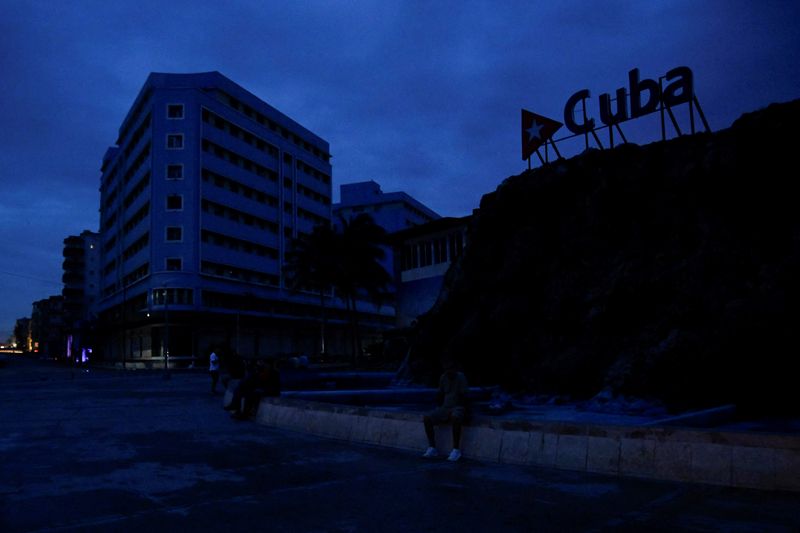By Dave Sherwood and Marianna Parraga
HAVANA (Reuters) – Cuba restored power to its power grid at midnight on Friday, officials said, hours after the island experienced a countrywide blackout following the collapse of one of its main power plants.
Most of the country’s 10 million residents were still in darkness on Friday evening, but some areas of the capital Havana, including some of the city’s major hospitals, saw lights return shortly after dark.
Power grid operator UNE said it hoped to restart at least five oil-fired power plants overnight, providing enough electricity, it said, to begin restoring electricity to wider areas of the country.
The Communist Party-led government closed schools and non-essential industries early Friday and sent home most of the country’s workers in a last-ditch effort to keep the lights on after weeks of severe electricity shortages. Recreational and cultural activities, including nightclubs, were also ordered to close.
But shortly before noon, the Antonio Guiteras power plant, the country’s largest and most efficient power plant, went offline, causing a complete grid failure and suddenly leaving the entire island without power.
Officials said late Friday that they were working to fix problems that caused the oil-fired power plant to fail. They did not specify the cause of the collapse.
The power outage marked a new low on the island where life became increasingly unbearable, with residents suffering from shortages of food, fuel, water and medicine.
Almost all trade in Havana stopped on Friday. Many residents sat sweating in front of their house doors. Tourists hunkered down in frustration. As night fell, the city was almost completely shrouded in darkness.
“We went to restaurants and they didn’t have food because there was no electricity, now we don’t have internet either,” said Brazilian tourist Carlos Roberto Julio, who had just arrived in Havana. “In two days, we already faced several problems. .”
Prime Minister Manuel Marrero this week blamed worsening power outages over the past few weeks for a storm most Cubans are familiar with – deteriorating infrastructure, fuel shortages and rising demand.
“Fuel shortages are the biggest factor,” Marrero said in a televised message to the nation.
Strong winds that started with Hurricane Milton last week have crippled the island’s ability to transport scarce fuel from offshore ships to power plants, officials said.
FUEL REDUCTION
The Cuban government has also blamed the US trade embargo, as well as sanctions under President Donald Trump, for difficulties obtaining fuel and spare parts to operate its oil-fired power plants.
“This complex scenario is primarily caused by the intensifying economic war and financial and energy repression in the United States,” Cuban President Miguel Diaz-Canel told X on Thursday.
A spokesperson for the White House National Security Council said, “The United States is not to blame for today’s power outages on the island, or the overall energy situation in Cuba.”
A State Department official said late Friday that Washington was closely monitoring the potential humanitarian impact of the power outages, but the Cuban government had not requested assistance.
For many Cubans, far removed from politics and accustomed to regular blackouts, the nationwide blackout was nothing more than an ordinary Friday night.
Carlos Manuel Pedre says he doesn’t do simple pleasures to pass the time.
“In the times we live in, with everything that is happening in our country, the most logical entertainment is dominoes,” he said while playing the popular game with his friends. “We are in a total crisis.”
Although demand for electricity has increased in recent years along with the growth of Cuba’s private sector, fuel supplies have fallen sharply.
Cuba’s biggest oil supplier, Venezuela, has reduced shipments to the island to an average of 32,600 barrels per day in the first nine months of this year, almost half of the 60,000 barrels per day it shipped in the same period in 2023, according to ship monitoring data and documents internal delivery from the Venezuelan state company, PDVSA.
PDVSA, whose refining infrastructure is also poor, has this year sought to avoid a new wave of fuel shortages at home, leaving smaller volumes for export to allied countries such as Cuba.

Russia and Mexico, which have in the past sent fuel to Cuba, have also reduced shipments significantly.
These shortages leave Cuba to fend for itself in a much more expensive spot market at a time when its government is nearly bankrupt.






